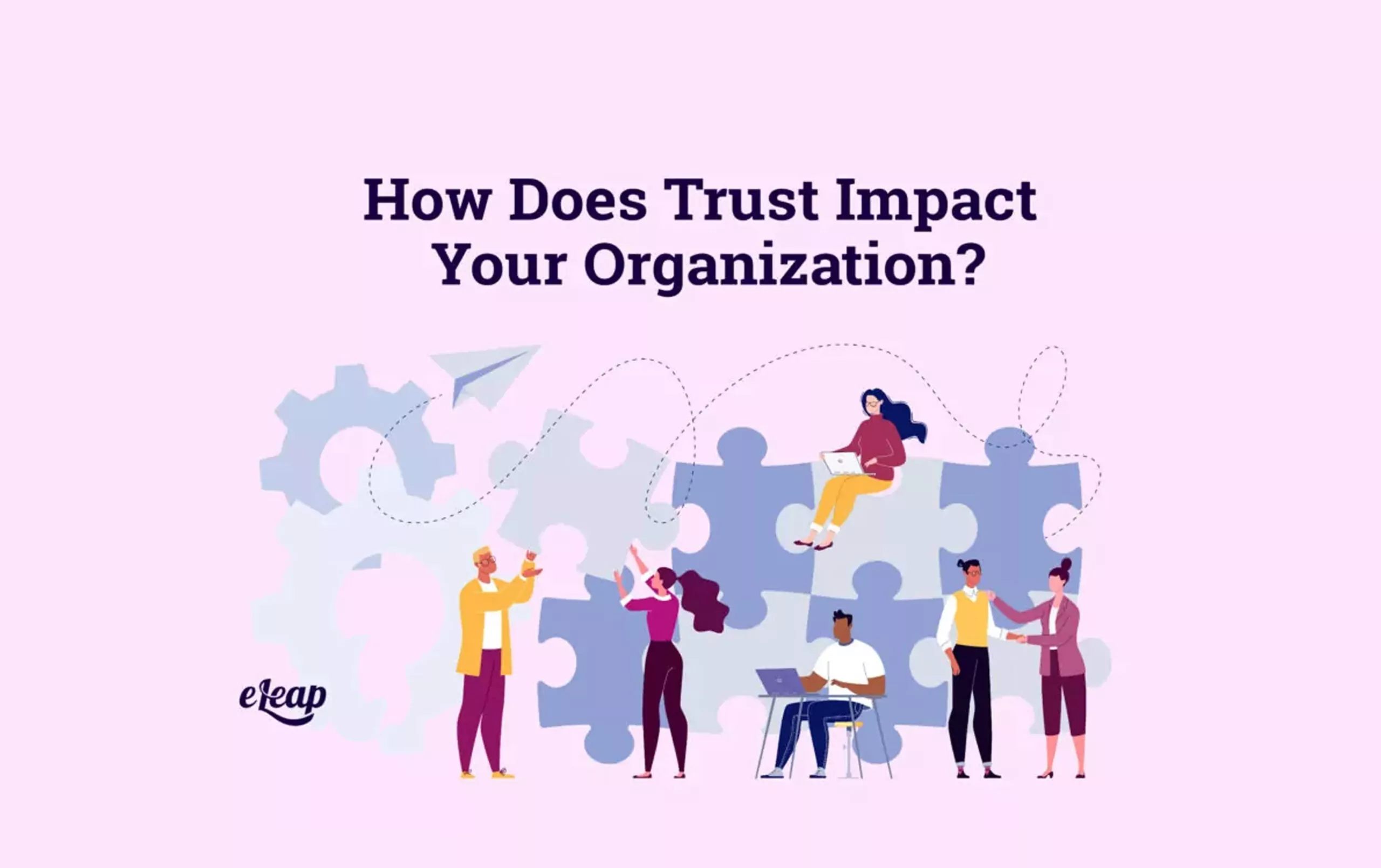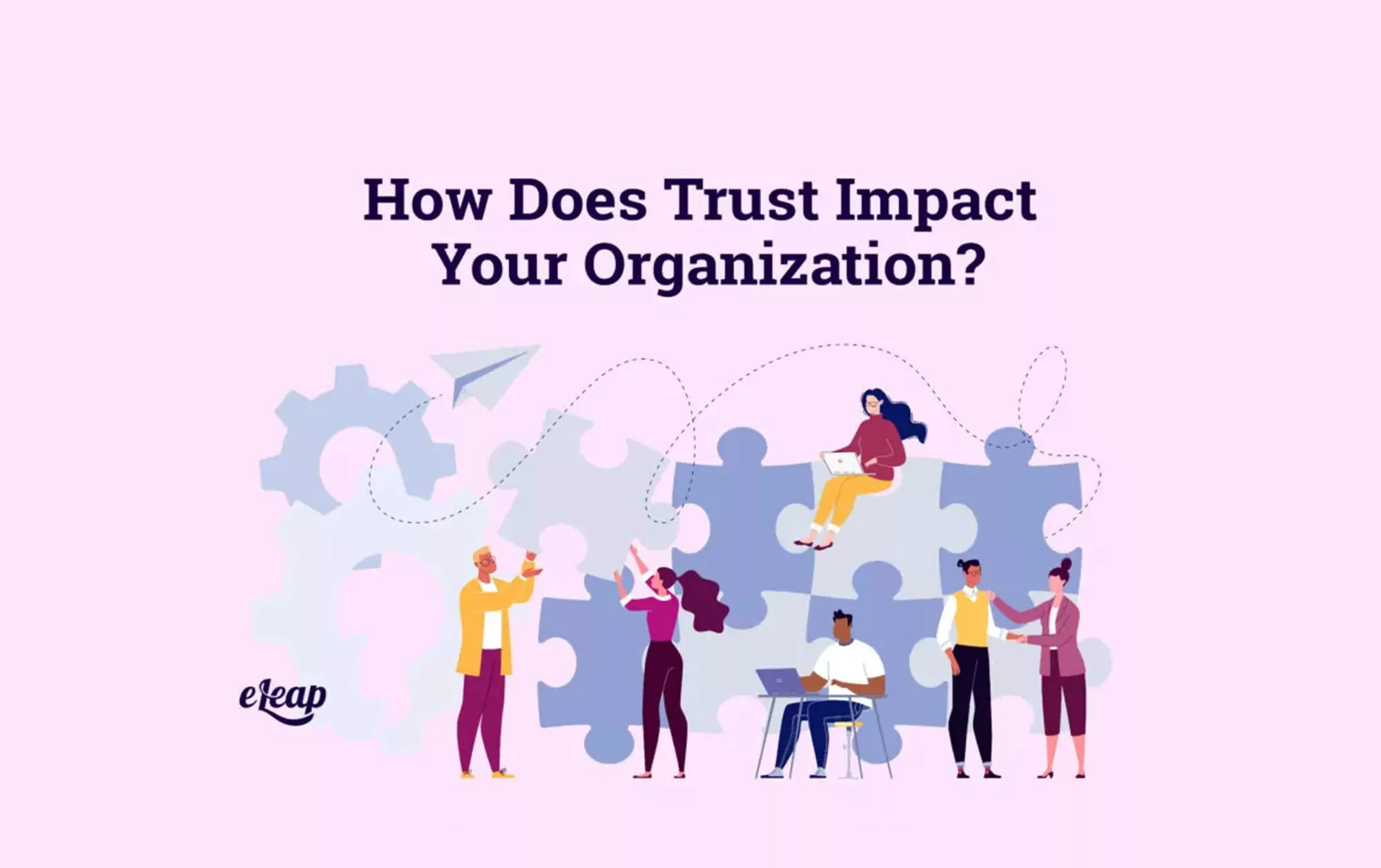How Does Trust Impact Your Organization?

The value of trust in the workplace is undeniable. However, many employees are distrustful of the leaders and organizations they work for despite their critical importance. Since the 2020 Coronavirus pandemic, the importance of trust has become even more apparent due to remote work. It can be very tricky for in-person employees to trust their leaders and coworkers. Let alone those who aren’t physically present in the workplace. Explore how eLeaP’s Performance Management Platform can simplify evaluations, boost productivity, and drive measurable results.
Most employees find it easier to trust their coworkers than their leaders, according to studies showing that trust improves as you rise in your organization. But while it’s good that coworkers trust one another, the smooth operation of any organization relies on trusting its leadership. You’ll begin to experience a number of negative consequences without a trusting environment where everyone can rely upon one another.
Your organization’s speed and efficiency can suffer from a lack of trust. As trust increases in the workplace, coworkers and leaders are more productive. This has a direct impact on how much your organization spends. Yes, trust can cause you to lose money. Employees who lack trust find it harder to be efficient and productive. By the same token, high levels of trust improve employee productivity, speed, and efficiency and save your company money.

The Three P’s of Trust
Trust is a complex concept. It won’t happen overnight, and it can be difficult to rebuild it once it’s broken. In order to properly understand how trust impacts your company, let’s explore the Three P’s of Trust.
- Personal: An open mind is important for managers. Adapt your methods when feedback comes in and implement the changes necessary. You need to create a personal connection with your employees in order for trust to blossom and for them to feel confident sharing their feedback.
- Professional: For professional trust to develop, you must be present and available. It is important to your team that they can trust you to keep your word, follow through on your actions, and be able to respond to them.
- Partnered: You and your team must be respectful of each other and align your goals so you’re able to work together.
Furthermore, in order for trust to flourish, it needs a number of building blocks. Communication and accountability are among the most crucial. It is imperative that accountability is maintained. Missed goals should be held accountable by you and others. It is also important to communicate well. As more and more organizations hire remote workers, it is especially important. Let’s look at some of the reasons why building trust is crucial.
Trust Enhances Teamwork
It is no secret that employees need to be able to trust one another in order to work well together as a team. Having trust in one another increases employees’ likelihood of collaborating on and leading projects. Employers increasingly realize the need to build trust as more people work from home.
Communication problems among employees are the primary cause of poor collaboration. It is imperative that open, honest communications take place in the workplace to build trust and collaboration.
Trust Improves Alignment
The more trust employees have in their company, the more likely they are to achieve its goals. The likelihood of aligning an organization that has multiple offices in multiple countries decreases within large global organizations. Employee disunity can be avoided by clearly communicating a company’s values, mission, and vision to its employees.
Trust Enhances Efficiency, Productivity, and Engagement
Billions of dollars of losses occur annually because of employee disengagement. Trust issues are largely responsible for disengagement. High engagement levels indicate trust in managers, whereas low engagement levels indicate a serious lack of trust amongst teams. According to research, workplaces that foster trust benefit from:
- A 50% higher employee productivity
- 106% more energy at work
- 13% fewer sick days
Furthermore, companies with high levels of trust outperform those with low levels of trust by approximately 186%.
Trust Leads to Better Decision Making
It takes trust on all sides for a workplace to be highly trustworthy. Trust improves the ability of teams and leaders to make the right decisions. Furthermore, this synergy encourages managers to support employees in making those decisions by empowering them to think and decide things for themselves.
Trust Decreases Burnout and Stress
When employees feel trusted, and as though they can rely on others, they are less likely to experience stress and burnout. Employee motivation and productivity are negatively affected by stress and burnout in the workplace. Employers should seek ways to prevent these challenges. Building trust within the company and having a transparent company culture will reduce stress levels.
Trust Improves Loyalty and Retention
There is a very high turnover rate when employees are burnt out. The risk of burnout makes employees much more likely to leave their employers. In fact, the risk is 2.5 times higher.
The relationship between burnout and trust has already been discussed. Another third of employees say their loyalty to employers would increase if their leaders kept their promises and that enhanced transparency would result in better job performance.
Trust is A Defense Against Resistance to Change
Organizations and employees are beginning to embrace digital transformations at their workplace, particularly following the pandemic. Remote work has reaped numerous benefits, but it has also been challenging for some. Achieving successful remote work requires the alignment of the entire workforce within an organization. In general, most organizations struggle with the concept of change. If you want change to succeed, you need your employees’ support and cooperation.
In times of change, internal communication is essential to motivating people and educating them. The decision-making processes and new initiatives of your organization are more likely to be trusted when effectively communicated. Trust is necessary for change to happen smoothly.
Remember, trust is built and maintained by small actions over time. You must understand why trust is important to your organization and how it, or the lack of it, can affect your organization. Hopefully, the tips discussed in this article will help you understand the importance of working on trust within your organization.